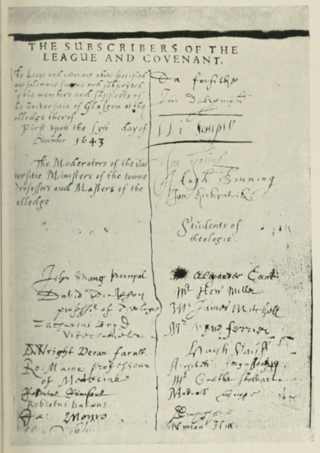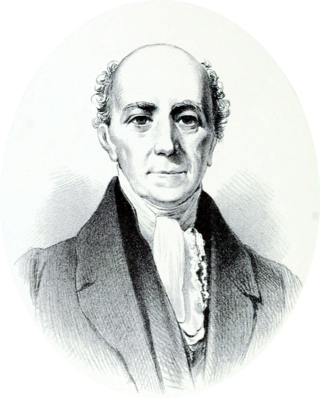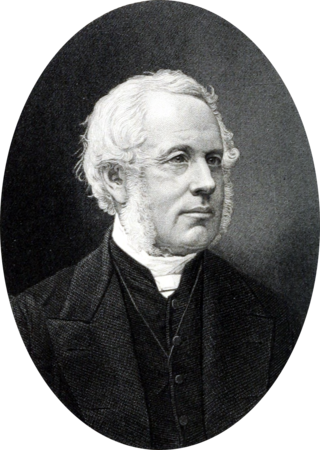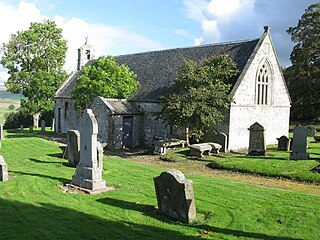Gilbert Rule was a nonconformist Church of Scotland minister and the Principal of the University of Edinburgh from 1690 to 1701.
Henry Guthrie was a 17th-century Scottish historian and cleric who rose to be Bishop of Dunkeld.

Fodderty is a small hamlet, close to Dingwall, Ross-shire in the Scottish Highlands and is in the Scottish council area of Highland.

David Dickson (1583–1663) was a Church of Scotland minister and theologian.

John Strang (1584–1654) was a Scottish minister and Principal of Glasgow University. He was a signator to the National Covenant of 1638.
John Simson (1667–1740) was a Scottish "New Licht" theologian, involved in a long investigation of alleged heresy. He was suspended from teaching as Professor of Divinity at the University of Glasgow for his later life.

Patrick MacFarlan was a Scottish minister who served as Moderator of the General Assembly of the Church of Scotland in 1834 and as Moderator of the General Assembly of the Free Church of Scotland in 1845.

Robert Buchanan (1802–1875) was a Scottish Presbyterian minister and historian who served as Moderator of the General Assembly to the Free Church of Scotland in 1860/61. He was one of the leading figures in the Disruption of 1843.

James Julius Wood (1800–1877) was a 19th-century Scottish minister who served as Moderator of the General Assembly of the Free Church of Scotland 1857/8.

Robert Elder (1808–1892) was a Scottish minister of the Free Church of Scotland who served as Moderator of the General Assembly to the Free Church 1871/72.

Patrick Anderson of Walston was a 17th-century minister and Covenanter.

Rev Archibald Riddell (1635–1708) was a Scots-born 17th-century Presbyterian church minister in Scotland and America. His name is sometimes spelled Riddel. He preached at conventicles in a time when such actions were considered high treason. He was imprisoned on the Bass Rock and was later banished to New Jersey.

James Drummond was a seventeenth century Scottish covenanting field preacher. He was imprisoned on Bass Rock for around nine months. At the time of his incarceration his occupation was listed as chaplain to Margaret, Marchioness of Argyll.

Rev Thomas Hog of Kiltearn (1628–1692) was a controversial 17th century Scottish minister.

Alexander Forrester (1611–1686) was a Scottish minister of the 17th century.

Robert Gillespie was a 17th-century Presbyterian preacher. His father was George Gillespie the famous Westminster Divine. His mother was Margaret Murray, who had £1000 sterling voted by Parliament immediately after George's death, for the support of herself and family, but, owing to the distractions of the time, it was never paid. Robert was baptised 15 May 1643.

John Law (1632–1712) was a 17th-century Presbyterian minister from Scotland. He became Moderator of the General Assembly in 1694 and later was a prisoner on the Bass Rock.
Thomas Ross of Nether Pitkerrie, was born about 1614. He was the son of George Ross of Nether Pitkerrie. He continued in Kincardine after the establishment of prelacy and owes his leaving to a meeting with John M'Gilligan.
Robert Cunningham was one of the early Scots ministers who settled in Ulster in the 17th century. He was the first Presbyterian minister in Holywood and was one of Samuel Rutherford's correspondents. He was deposed for his adherence to Presbyterian principles.
Andrew Hay of Renfield (c.1540–1593) was a Scottish minister who served twice as Moderator of the General Assembly of the Church of Scotland in both 1573/4 and 1580/1. From 1569 to 1586 he was also Rector of the University of Glasgow.















